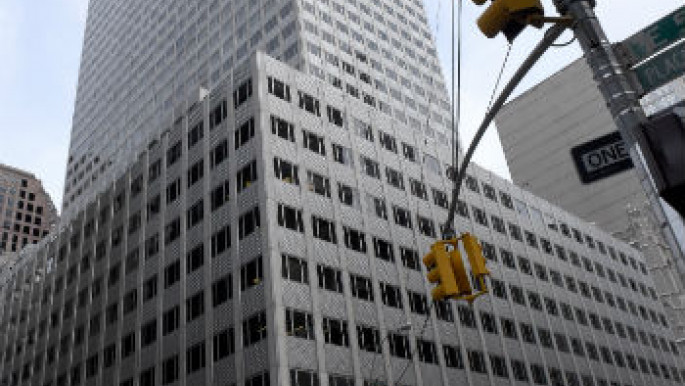Trump's son-in-law entrenches Washington divisions after Qatar bailout deal fails
Senior White House adviser Jared Kushner's campaign against Doha, which has deepened rifts within the US government allegedly began after a Qatari billionaire reportedly refused to loan him $500 million to bail him out after a failed business deal.
Kushner, also US President Donald Trump's son-in-law, tried and failed to seek half a billion dollars from Hamad bin Abdullah al-Thani to save a New York City real estate purchase which has caused Kushner to accumulate huge debts, according to an investigation.
666 Fifth Avenue was purchased for a record-breaking $1.8bn in 2007, and has since been "underperforming" following the global financial crisis.
The crash in rent prices didn't stop an exodus of tenants, leaving Kushner short on cash to pay his debts from the purchase. He has reportedly been left with a $1.2 billion interest-only mortgage to pay off by February 2019.
During Trump's election campaign, Kushner had attempted to reach out to al-Thani, who eventually agreed to save the building under a set of conditions. However, by the time al-Thani agreed to help Kushner, Chinese insurance company Anbang had agreed a $4bn construction loan to develop the property in early March.
 |
|
| The 41-storey 666 Fifth Avenue is at the centre of the latest storm surrounding Jared Kushner [AFP] |
The deal fell through weeks later amid a conflict of interest, and Kushner returned to al-Thani.
However, Kushner was unable to meet al-Thani's funding demands, and the deal fell apart.
There are conflicting reports on whether the deal was killed by al-Thani, or whether it was postponed mutually.
Soon after, the Saudi Arabia began its blockade on Qatar, with Riyadh and its allies receiving strong support from Donald Trump's White House, reportedly upon Kushner's advice.
But the White House's vocal support put the presidency at odds with other senior figures in the administration.
At the start of the blockade, US Defence Secretary James Mattis was reported to have been in "shock" and then "disbelief" at the Saudi move, according to a senior military officer.
"He thought the Saudis had picked an unnecessary fight, and just when the administration thought they'd gotten everyone in the Gulf on the same page in forming a common front against Iran," the official added.
Other senior military figures were also reportedly concerned by Trump's escalatory rhetoric, considering the presence of more than 10,000 US troops in Qatar, as well as a Navy base in Bahrain, and no desire among the brass to have military personnel entangled in a regional dispute.
US Secretary of State Rex Tillerson had also hinted at his discontent towards Trump's discourse at a press briefing in June.
"We certainly would encourage the parties to sit down together and address these differences. And we - if there's any role that we can play in terms of helping them address those, we think it is important that the GCC remain unified," he said, urging a vastly more conciliatory tone than the president.
— Donald J. Trump (@realDonaldTrump) 6 June 2017
" style="color:#fff;" class="twitter-post-link" target="_blank">Twitter Post
|
Tillerson also debunked Trump's claims that Qatar was promoting terrorism, by saying "all parties [Qatar, Saudi Arabia, UAE, Bahrain and Egypt] have been quite unified in the fight against terrorism and the fight against IS".
On Tuesday, Tillerson visited Doha, and called the Qatari position "reasonable".
"I think Qatar has been quite clear in its positions, and I think those have been very reasonable," Tillerson, a former oilman with years of experience in the region, told reporters.
Having previously met officials in Kuwait, which has been acting as a mediator in the diplomatic crisis, the visit to Doha was Tillerson's second stop on a shuttle-diplomacy circuit that is also expected to take him to Saudi Arabia - which shares Qatar's only land border and is the most powerful of the four countries lined up against it.
Tillerson went on to sign a US-Qatar deal on fighting terrorism together, further cementing ties between the US diplomatic and military establishment and Doha. The White House, counselled by Jared Kushner, has yet to comment on the agreement.
Follow us on Twitter: @The_NewArab
![US President Donald Trump lands in Riyadh [AFP] US President Donald Trump lands in Riyadh [AFP]](/sites/default/files/styles/image_345x195/public/media/images/246D8E3A-8ADD-412E-9893-D6E011A9C574.jpg?h=d1cb525d&itok=QrRq9QmC)




 Follow the Middle East's top stories in English at The New Arab on Google News
Follow the Middle East's top stories in English at The New Arab on Google News
![Israeli forces ordered bombed Gaza's Jabalia, ordering residents to leave [Getty]](/sites/default/files/styles/image_330x185/public/2176418030.jpeg?h=a5f2f23a&itok=_YGZaP1z)

